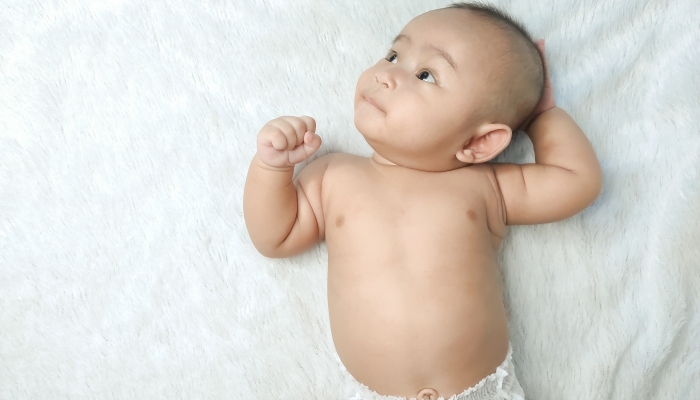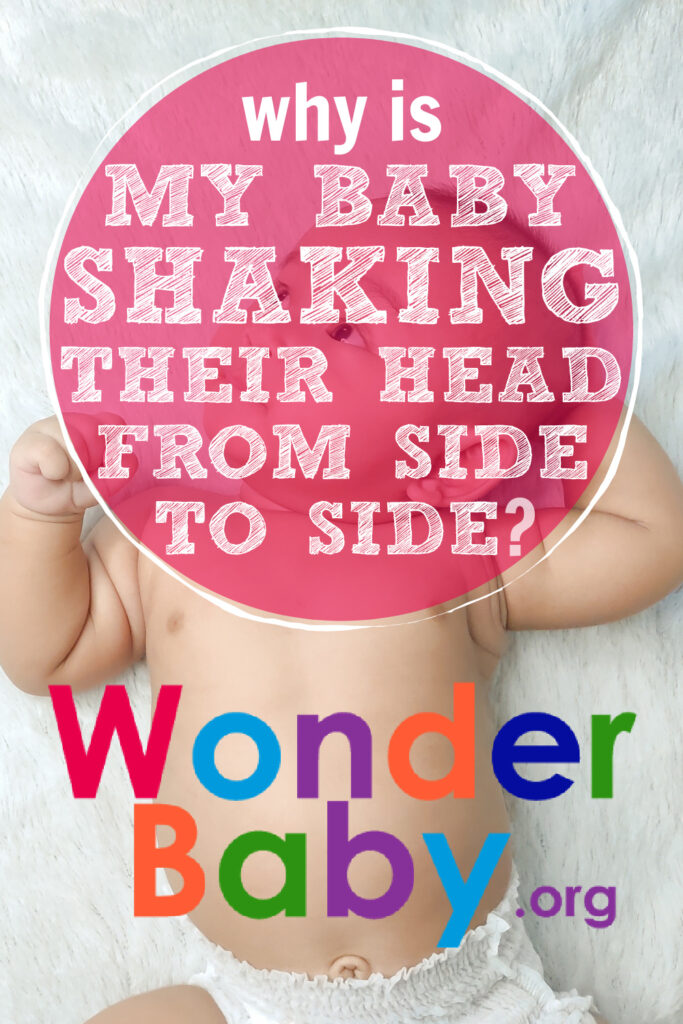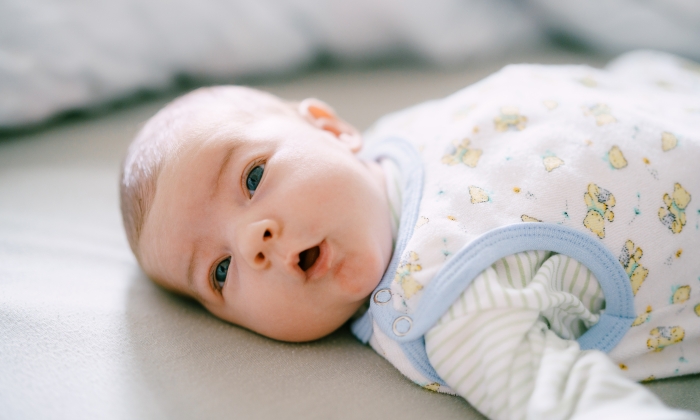Why Is My Baby Shaking Their Head From Side to Side?

- Babies can control their head enough to turn towards sound by about 2 months of age.
- Babies have complete control of their head by around 4-6 months of age.
- Head shaking might be soothing for your baby and can be completely normal.
- If head shaking is accompanied by other shaking body parts, it could be a seizure.
- Talk to your pediatrician if your baby is shaking their head often and does not meet developmental milestones.
When you bring your new baby home, you probably celebrate every new sound and motor skill they learn. Parents are often teased about their bragging or worrying about when their baby meets different developmental milestones. While you will probably be delighted when they smile and coo, you might be concerned if they start to shake their head side to side.
Many new parents wonder, Why is my baby shaking their head from side to side? There are many reasons babies might shake their heads, and whether or not to worry depends on how often they do it as well as accompanying symptoms and behaviors. Some head shaking is normal, while constant head shaking may indicate a problem.
Baby Shaking Their Head Side to Side: Is It Normal?
In most cases, baby head shaking is a normal part of developing motor skills. There are a few reasons your baby shakes their head as part of normal behavior.
Babies attempt to soothe themselves by shaking their head from side to side while falling asleep. They may also be experimenting with newly developed muscle control in their neck. Most children start shaking their head around two months old, and grow out of it by age two.

Normal Reasons Why Babies Shake Their Head
As a child’s development progresses, there are a few normal reasons for your baby’s shaking head.
Soothing Behavior
Repetitive motions can be soothing for an infant or child. Imagine sitting in a rocking chair or a hammock. Feeling the back-and-forth motion can be calming and relaxing. As they fall asleep, head shaking may be your baby’s attempt at creating that same rocking motion.
Head shaking may be an unconscious behavior your baby does as they take in the world around them. Think about a nervous habit you may have, like tapping your foot or clicking a pen. These are both things that you do without much thought while you are thinking or concentrating. Baby head shaking might be thought of as something similar.
Play
Remember that everything is new and exciting for a developing baby. In the same way you might enjoy learning a new skill, babies shake their heads because they are having fun using their developing neck muscles.
Similarly to tongue chewing, they are often just having a new sensory experience. Because everything is so new and fun, something like head shaking that seems silly to you might be highly entertaining for a new baby.
Trying to Latch on for Breastfeeding
If you notice your baby shaking their head close to mealtimes, they may be trying to latch on for breastfeeding. As babies learn to breastfeed, they will need to practice the correct position of their head, mouth, and tongue. The head shaking might happen multiple times before they are able to figure it out and get a good latch.
Is Head-Shaking a Sign of Autism in Babies?
Head shaking could be a sign of autism spectrum disorder. However, head shaking alone does not indicate that your baby is on the spectrum. If other signs and symptoms accompany head shaking, you may need to speak with your pediatrician about the possibility of an autism diagnosis.
Other signs of autism include:
1. Poor eye contact
Most babies start to make eye contact around six to eight weeks old. Children with autism may have a significant delay in making eye contact or may never make eye contact at all.
2. Poor social interactions
While this is usually more obvious in older children, infants who do not show any signs of interacting with you or others can be assessed for autism.
3. Developmental delays
Depending on where a child falls on the autism spectrum, they may experience mild to severe developmental delays. Your pediatrician should be able to guide you through typical developmental milestones at your child well-check visits.
4. Other repetitive behaviors
Repetitive behaviors, especially ones that cause injuries like head banging or scratching, may be a sign of autism in babies and children.
How to Help Stop Babies From Shaking Their Heads Too Much
Usually, there is no reason to make your baby stop head shaking. Most babies who shake their head outgrow it by 18 months, or three years at the latest. The most important thing to do is find out the reason for the shaking head, and decide what to do about it then.
If your baby’s shaking head is accompanied by fussing or crying, they may be uncomfortable or hungry. Try nursing your baby or rocking them to see if it helps them calm down. You can also use baby massage or move them to a calm environment to help soothe them. Some cases of head shaking in babies may be due to an infection, and if you are unable to soothe them, you might need to visit your child’s doctor.

When to Worry About Your Baby’s Head Shaking
Although head shaking is usually a normal sign of development used for fun or self-soothing, head shaking is worrisome when accompanied by other signs.
Seizures
When most people picture a seizure, they usually picture the entire body shaking uncontrollably. This is called a grand-mal seizure, and can be terrifying for both you and your baby. Unfortunately, not all seizures are so obvious. According to Nationwide Children’s Hospital, some seizures, called focal seizures, only affect one part of the body. They may involve just one limb or just the head.
Baby shaking head side to side does not normally indicate a seizure, but the head turning to one side and seeming to be stuck there indicates a problem. The child’s gaze may also seem to be stuck in one place and they may become unresponsive. If you think your baby is having a seizure, get them away from any table corners or sharp objects, avoid putting anything in their mouth, and call for help immediately.
Spasms
Spasms are a type of seizure, but usually smaller, shorter, and less serious. Experts at the Cleveland Clinic explain that spasms in infants are jerky movements that might happen in your baby’s abdomen, head, arms, or legs. They usually last for one or two seconds and often occur right after your baby wakes up. Spasms look different than normal head shaking, they are more of a jerking motion and may be accompanied by an unusual gaze.
Dr Richard Hrachovy and Dr James D Frost Jr writing in the Handbook of Clinical Neurology, define infantile spasms as “a unique disorder of infancy and early childhood. The average age at onset of infantile spasms is 6 months and … [a]pproximately one-quarter of patients will spontaneously stop having spasms within 1 year of onset.” Their review concludes that “there is no conclusive evidence that medical or surgical treatment of infantile spasms significantly alters long-term outcome.”
Spasms or jerking head motions can be signs of neurological disorders and require medical intervention.
Shuddering Attacks
According to Jessie J. Wang and Ran D. Goldman of the College of Family Physicians of Canada, shuddering attacks are different from seizures because a child is fully conscious during an episode. They are a neurological disorder that can look a lot like a seizure and can be scary for children and their parents.
The best way to distinguish between shuddering attacks and seizures is to visit your healthcare provider for advanced testing. Almost all children who experience shuddering attacks outgrow the condition by the age of two.
Ear Infections
An ear infection can be very painful and uncomfortable for your baby. If your baby bangs or shakes their head, starts ear pulling, or has any drainage out of their ears, they probably have an ear infection.
It is important to get treatment for an ear infection as soon as possible. Chronic ear infections can lead to hearing problems and delayed speech production in babies and toddlers.
Head Banging
If your baby is injuring themselves, they should be stopped immediately. While some head banging might be a way for a small child to show frustration, early interventions should be used to stop it from happening often.
Frequent head banging and other self-injurious repeated movement are signs of autism spectrum disorder or developmental delays. Head banging accompanied by a delay in the development of gross motor skills is concerning.
Head banging may be considered a Stereotypic Movement Disorder (SMD). Dr Katherine Mackenzie in Seminars in Pediatric Neurology, notes that SMDs “begin before 3 years of age and continue into adulthood… [S]econdary stereotypies ensue in the setting of an additional diagnosis such as autism spectrum disorder or other neurologic disorders. They are highly associated with comorbidities such as anxiety, obsessive-compulsive symptoms, inattention, and tics.”
FAQs
Do babies outgrow head shaking?
Most babies outgrow head shaking. The exceptions to this rule are children on the autism spectrum, children with developmental delays, or children with a neurological disorder. If your child’s shaking head does not stop by the age of two, you should talk to your child’s doctor about it.
Can head shaking in babies lead to shaken baby syndrome?
Shaken baby syndrome is a serious condition that is caused by extreme back and forth force to a baby’s head. Even if a baby shakes their head constantly, they cannot give themselves shaken baby syndrome. The only way for a baby to get shaken baby syndrome is by someone else causing their injury.
References
- Cleveland Clinic. Infantile Spasms. Accessed April 16, 2023. https://my.clevelandclinic.org/health/diseases/22494-infantile-spasms
- Hrachovy RA, Frost JD Jr. Infantile spasms. Handbook of Clinical Neurology. 2013;111:611-8. doi: 10.1016/B978-0-444-52891-9.00063-4. PMID: 23622208.
- Katherine M. Stereotypic Movement Disorders. Seminars in Pediatric Neurology. 2018 Apr;25:19-24. doi: 10.1016/j.spen.2017.12.004. Epub 2017 Dec 26. PMID: 29735112.
- Merck Manual. Middle Ear Infections. Published July 13, 2018. Accessed April 16, 2023. https://www.merckmanuals.com/home/news/editorial/2018/07/13/20/25/middle-ear-infections
- Nationwide Children’s Hospital. Seizures: Focal (Partial). Accessed April 16, 2023. https://www.nationwidechildrens.org/conditions/seizures-focal-partial
- Wang JJ, Goldman RD. Shuddering attacks: A benign phenomenon in children. Canadian Family Physician. 2021 Feb;67(2):107-108. doi: 10.46747/cfp.6702107. PMID: 33608360; PMCID: PMC8324121.

The information WonderBaby provides is not intended to be, and does not constitute, medical or other health advice or diagnosis and should not be used as such. Always consult with a qualified medical professional about your specific circumstances.
Related Posts

Health & Nutrition
Can Baby Skin Care Products Expire?
Is that forgotten tube of diaper rash cream still safe to use? Learn more about the expiration dates of popular skin care products for infants.

Health & Nutrition
Boosting Immunity in Kids: 3 Tips for a Healthy Winter
Parents can help boost their kids’ immunity during cold and flu season by maintaining healthy eating, sleeping, and exercising habits in the winter.

Health & Nutrition
Flat Head Syndrome and Torticollis: What You Should Know
Torticollis, or tight muscles in the neck, may cause your baby to have a flat spot on their head that needs to be assessed and treated by a physician.